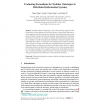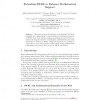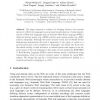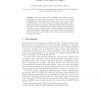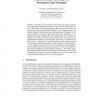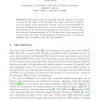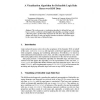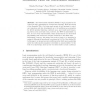106
click to vote
RR
2007
Springer
15 years 8 months ago
2007
Springer
Modern semantic technology is one of the necessary supports for the infrastructure of next generation information systems. In particular, large international organizations, which u...
109
click to vote
RR
2007
Springer
15 years 8 months ago
2007
Springer
Geo-ontologies have a key role to play in the development of the geospatial-semantic web, with regard to facilitating the search for geographical information and resources. They no...
116
click to vote
RR
2007
Springer
15 years 8 months ago
2007
Springer
This paper presents an extension to the Semantic Web Rule Language and a methodology to enable advanced mathematical support in SWRL rules. This solution separates mathematical and...
135
click to vote
RR
2007
Springer
15 years 8 months ago
2007
Springer
For the foreseeable future, most data will continue to be stored in relational databases. To work with these data in ontology-based applications, tools and techniques that bridge t...
RR
2007
Springer
15 years 8 months ago
2007
Springer
166
click to vote
RR
2007
Springer
15 years 8 months ago
2007
Springer
Abstract. This essay describes fuzzy CARIN, a knowledge representation language combining fuzzy description logics with Horn rules. Fuzzy CARIN integrates the management of fuzzy l...
RR
2007
Springer
15 years 8 months ago
2007
Springer
112
click to vote
RR
2007
Springer
15 years 8 months ago
2007
Springer
Expressing rules in controlled natural language can bring us closer to the vision of the Semantic Web since rules can be written in the notation of the application domain and are u...
111
click to vote
RR
2007
Springer
15 years 8 months ago
2007
Springer
This work presents a visualization algorithm for defeasible logic rule bases as well as a software tool that applies this algorithm, according to which, a directed graph is produce...
112
click to vote
RR
2007
Springer
15 years 8 months ago
2007
Springer
The well-founded semantics (WFS) for logic programs is one of the few major paradigms for closed-world reasoning. With the advent of the Semantic Web, it is being used as part of r...
